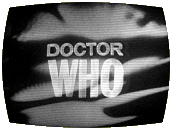 After the TARDIS leaves Rome behind, it’s dragged off course to the planet Vortis, where some force keeps the time machine trapped. The Doctor’s attempts to take off again are futile, and he and Ian leave the TARDIS as Vicki recovers from hearing a strange noise that had an unusual effect on her. Aboard the TARDIS, Babara also experiences something odd, as though she’s being drawn out of the time machine and onto the planet’s surface. There, she encounters the butterfly-like Menoptera, who are desperately planning the last battle of a war against the ant-like Zarbi, who have the advantage in their sheer numbers. Controlled by a malevolent consciousness called the Animus, the Zarbi move the TARDIS from its landing site, capture the Doctor, Ian and Vicki, and make a deal with the Doctor: his friends’ lives will only be spared if he helps to defeat the Menoptera.
After the TARDIS leaves Rome behind, it’s dragged off course to the planet Vortis, where some force keeps the time machine trapped. The Doctor’s attempts to take off again are futile, and he and Ian leave the TARDIS as Vicki recovers from hearing a strange noise that had an unusual effect on her. Aboard the TARDIS, Babara also experiences something odd, as though she’s being drawn out of the time machine and onto the planet’s surface. There, she encounters the butterfly-like Menoptera, who are desperately planning the last battle of a war against the ant-like Zarbi, who have the advantage in their sheer numbers. Controlled by a malevolent consciousness called the Animus, the Zarbi move the TARDIS from its landing site, capture the Doctor, Ian and Vicki, and make a deal with the Doctor: his friends’ lives will only be spared if he helps to defeat the Menoptera.
written by Bill Strutton
directed by Richard Martin / insect movement by Roslyn de Winter
music from stock music libraryGuest Cast: Robert Jewell, Jack Pitt, Gerald Taylor, Hugh Lund, John Scott Martin, Kevin Manser (Zarbi), Roslyn de Winter (Vrestin), Arne Gordon (Hrostar), Arthur Blake (Hrhoonda), Jolyon Booth (Prapilius), Jocelyn Birdsall (Hlynia), Martin Jarvis (Captain Hilio), Ian Thompson (Hetra), Barbara Joss (Nemini), Catherine Fleming (voice of the Animus)
Broadcast from February 13 through March 20, 1965
LogBook entry & review by Earl Green
Review: If there’s anything that everyone can agree on when it comes to The Web Planet, it’s this: it was a brave attempt. For 1965, on a studio-bound BBC-TV budget, The Web Planet is an extraordinarily bold attempt to do large-scale science fiction, telling a story with imagination unfettered by the chains of budget and other production realities. The problem, of course, being that the end result was completely, woefully fettered with those very things; The Web Planet comes off as a great idea hindered by its own budget, or something so trippy that it’s entertaining in a bad-B-movie way.
To be fair, neither The Web Planet nor any other Doctor Who adventure from this phase of the show’s history was expected to be repeated many times, let alone cleaned up and put under the high-resolution microscope of a medium like DVD. So I can forgive the obvious painted background of the planet surface, admire the sometimes bizarre insectoid costumes, bask in the truly alien atmosphere of the setting, and, yes, get a big laugh out of sometimes unintentionally funny scenes such as a Zarbi “larva gun” creature being smashed up against the scenery like a giant cockroach. But I also puzzle over such things as the “Vaseline-smeared-on-the-camera-lens” look of the exterior scenes on Vortis, and the distracting but elaborately worked-out body language choreography of the various alien races.
In the end, what you take into The Web Planet will determine what you leave with. If you’re expecting an epic tale to rival the modern revival of the series, you might as well go home. But if you’re expecting an ambitious-but-deeply-flawed story that, if you’re in the right frame of mind, is still strangely enjoyable, The Web Planet is a completely unique entry in the first Doctor’s TARDIS logs – even in later years, when there was more money to spend on creating alien environments for Doctor Who, the show never quite produced anything else like The Web Planet again.
